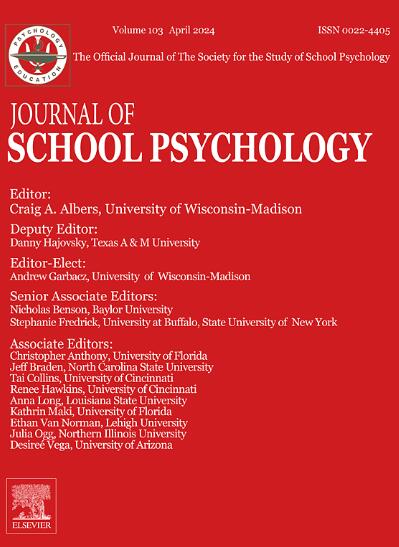Externalizing behaviors and student engagement: Exploring the protective role of parental involvement in school using latent moderated structural equation modeling
IF 4.1
1区 心理学
Q1 PSYCHOLOGY, SOCIAL
引用次数: 0
Abstract
Students presenting externalizing behaviors often exhibit reduced levels of student engagement, posing academic and well-being challenges. Among potential protective factors, the role of parental involvement in school is relatively unexplored. The objective of this study was to examine whether parental involvement could mitigate lower levels of engagement among these students. Data were collected from 742 Canadian elementary students at the beginning and the end of the school year. Latent moderated structural equation modeling was employed to assess the moderating role of four dimensions of parental involvement (i.e., expectations, communication, homework support, and school-based involvement) on behavioral, cognitive, and affective engagement. Results indicated that externalizing behaviors were negatively associated with behavioral engagement only when parental expectations were low (b = −0.394, p = .035) and with cognitive engagement only when homework support was low (b = −0.383, p < .001). These findings suggest the importance of promoting parental involvement, especially among students who exhibit high levels of externalizing behaviors.
外化行为与学生参与:利用潜在调节结构方程模型探索父母参与学校活动的保护作用
有外化行为的学生往往表现出学生参与度降低,给学业和福祉带来挑战。在潜在的保护性因素中,父母参与学校事务的作用相对来说尚未被研究。本研究旨在探讨家长的参与能否缓解这些学生参与程度较低的问题。本研究在学年开始和结束时收集了 742 名加拿大小学生的数据。研究采用了潜在调节结构方程模型来评估父母参与的四个方面(即期望、沟通、家庭作业支持和学校参与)对行为、认知和情感参与的调节作用。结果表明,只有当父母期望低时,外化行为才与行为参与负相关(b = -0.394,p = .035);只有当家庭作业支持低时,外化行为才与认知参与负相关(b = -0.383,p <.001)。这些研究结果表明了促进家长参与的重要性,尤其是对那些表现出高度外化行为的学生而言。
本文章由计算机程序翻译,如有差异,请以英文原文为准。
求助全文
约1分钟内获得全文
求助全文
来源期刊

Journal of School Psychology
PSYCHOLOGY, EDUCATIONAL-
CiteScore
6.70
自引率
8.00%
发文量
71
期刊介绍:
The Journal of School Psychology publishes original empirical articles and critical reviews of the literature on research and practices relevant to psychological and behavioral processes in school settings. JSP presents research on intervention mechanisms and approaches; schooling effects on the development of social, cognitive, mental-health, and achievement-related outcomes; assessment; and consultation. Submissions from a variety of disciplines are encouraged. All manuscripts are read by the Editor and one or more editorial consultants with the intent of providing appropriate and constructive written reviews.
 求助内容:
求助内容: 应助结果提醒方式:
应助结果提醒方式:


